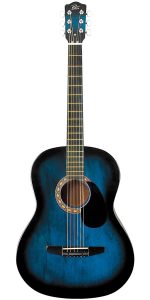The Rogue Starter acoustic guitar review – one of the best budget models?

- Fretboard: Ebony
- Top: Laminate spruce
- Neck: Maple
- Fretboard: rosewood
- ⅞ body size
Are rogue guitars any good?
First off, let’s answer the questions that I’ve been asked a lot recently: is Rogue a good guitar brand in general?
Short answer – yes.
Long answer: it depends on your goals.
They are known for offering affordable guitars, and they are often a popular choice for beginners or those on a tight budget.
However, their quality varies between models, and they may not meet the expectations of more experienced players seeking higher-end instruments.
So that’s exactly why you want to do your research and read other guitarists’ reviews before getting a Rogue guitar.
My thoughts:
My initial reaction to its price was to stick it in the realm of guitars too cheap to play, but after a bit of study, I’d recommend it to just about anyone with the extra cash.
For such a surprisingly good budget-friendly instrument. – I totally recommend getting one.
Pros
- Very affordable
- Good sound and playability for the lowest price
- Many different finish options
- Pinless bridge for easy restringing
- Versatile uses: travel instrument, student acoustic, project guitar
Cons
- No clear information on body woods used
- Some are shipped with defects or faults
- Plastic tuning hardware may not stay in tune
Rogue starter acoustic guitar – in-depth review
Construction
For the cost of the Rogue Starter, it would be fair to expect a plastic toy replica of a guitar– with fishing line strings, a loose and rattling neck, and fake tuning machines glued to a cracked headstock.
The reality is much better.
Body
Now, here is a bit of intrigue: no one who sells the Rogue Starter knows exactly what the body wood is. I checked every site– read all the specs, searched all the reviews, browsed all the Q&As.
Nothing.
One editorial review quietly claims it has a solid mahogany body, but I knew that couldn’t be true for the price.
So, I reached out to Musician’s Friend customer service for an answer. I received two different responses from two different representatives.
The first told me he believes the body is made of ash, and he can contact the manufacturer for clarification.
While we wait for that, I connected with a second Musician’s Friend rep who told me, “the top seems to be a mix of laminate spruce and a couple other things. Maybe mahogany sides, but there’s not a lot of information, which is surprising because Rogue is our in-house brand.”
 So, unless someone decides to… go rogue… and infiltrate their manufacturing facility, we may never know the body wood of the Rogue Starter acoustic guitar.
So, unless someone decides to… go rogue… and infiltrate their manufacturing facility, we may never know the body wood of the Rogue Starter acoustic guitar.
Despite the mystery, the body is well-constructed and comfortably designed at a 7/8 scale, and comes available in a variety of attractive finishes.
Kind of unusually, the Rogue Starter has a pinless bridge, in which strings are threaded through the bridge rather than held in place by pins.
Neck/Fretboard
Here, at least, we know the wood that gives the Rogue Starter its crisp and bright tone.
It’s paired with a classic rosewood fretboard, both durable woods that stand up against weather-induced warping.
Head
There’s not a lot special to mention about the headstock of the Rogue Starter, except to say that some people complain that the tuning machines do not hold.
However, many other people report no problems at all and claim it stays consistently in tune.
The mass-manufacturing required for producing such a low-cost guitar means that there will be inconsistencies among the line.
Throughout many positive reviews for the Rogue Starter acoustic are a few major complaints as some unfortunate people receive what might just be a dud guitar.
Some are shipped with high nuts and bridges that make the action really high. Others have frets with sharp edges extending past the fretboard.
It might be luck of the draw, but judging from the reviews odds are you’ll get a guitar that comes ready to play.
Sound
To be blunt, if it didn’t sound good enough to play, I wouldn’t be writing this Rogue Starter acoustic guitar review.
I’m a bit in awe of this guitar; I’d never expect something so cheap to sound as good as this does.
It’s certainly not great, and if the Rogue Starter acoustic is going to be your first guitar in a long musical journey, you’ll definitely want to upgrade sooner than later, like to the S6 Original by Seagull.
But for the price, it’s hard to beat.
This is a pretty simple sounding guitar: not a lot of overtones or harmonic complexity up and down the fretboard.
The lows, while not bellowing, are pleasantly warm.
Mids come in the strongest and are fairly punchy.
The high end might be a bit tinny, with a slight harshness in the highest registers owed to the maple neck and cheap laminate soundboard.
But what I think is most important– the Rogue Starter is properly intoned. Every fret sounds how it should, which can be a rare quality in budget acoustics at this price point.
Acoustic connoisseurs might turn their noses up at low-end instruments. But if you’re just looking to have a good time without the need for a lot of pomp and finery, the Rogue Starter acoustic is good enough to get the job done.
Playability
Unless you’re one of the unlucky few who are shipped a Rogue Starter in dire need of a setup, it is a surprisingly playable budget guitar.
Usually, they ship with the action set pretty low; in fact, almost low enough to cause problematic fret buzzing. All in all, most people don’t complain of any major problems, and it’s a popular guitar for children and beginner guitar students.
The naturally oily rosewood fretboard is comfortable to fret on as a piece of wood can be.
Occasionally, a Rogue Starter is shipped with frets that aren’t properly ground, but I haven’t read a case where they’ve been sharp enough to cut any fingers.
Appearance
Rogue offers the Starter acoustic guitar in a wide range of finishes. Every instrument has a certain beauty, so even if you buy it and never play, you’ll have a nice piece of art.
The Rogue Starter acoustic guitar is available in:
- Black – for the Johnny Cash enthusiasts; black pickguard; yellow rosette
- Blue Burst – a dark blue to black fade; looks as mysterious as the guitar’s body wood composition; black pickguard; yellow rosette
- Pink – a soft, cotton candy pink, for when you’re feeling pretty; white pickguard; yellow rosette
- Matte Natural – my favorite, looks like wood; black pickguard; yellow rosette
- Red Burst – a supernova, the eye of Sauron, a fading coal; black pickguard; yellow rosette
Summary
When I sat down to begin researching the Rogue Starter acoustic guitar, I thought I knew what to expect from such a low-cost instrument— a cheap toy, and nothing more.
Turns out all my assumptions were wrong and I am pleasantly surprised to be able to recommend it to literally everyone that can afford it. I’m not joking.
The last time I was searching for an inexpensive guitar online, it never crossed my mind that I could get one new at this price that would be worth playing at all. If I’d known about the Rogue Starter a year ago, I would own one now instead of my sketchy used Craigslist guitar.
This is a great guitar for absolute beginners who are unsure if playing acoustic is really what they want to do. It sounds and plays like a guitar should play, so it’s perfect for getting a feel for the instrument and deciding if it will be worth investing more time and money in a higher quality instrument down the road.
For travel, you can’t beat the price. It costs less than most suitcases and is easy to replace and hard to mourn if it’s ever lost or damaged.
Parents wondering if this is a good guitar for their child should consider its size.
However, many children have success learning and playing on full-size acoustics, so don’t let the size be a deterrent.
This is truly one of the most affordable instruments I’ve seen, so unlike a pricey piano or violin, it won’t be such a problem if your child turns out to not be much of a musician.
Finally, the Rogue Starter acoustic guitar is perfect for practicing upgrades and repairs.
It could really use a new set of steel tuning machines, a relatively cheap and easy fix. Additionally, it might benefit from a proper set-up and some fret grinding.
It’s the perfect guitar to take the kind of repair risks with that will eventually gain you confidence in the upkeep and maintenance of all your future guitars.

